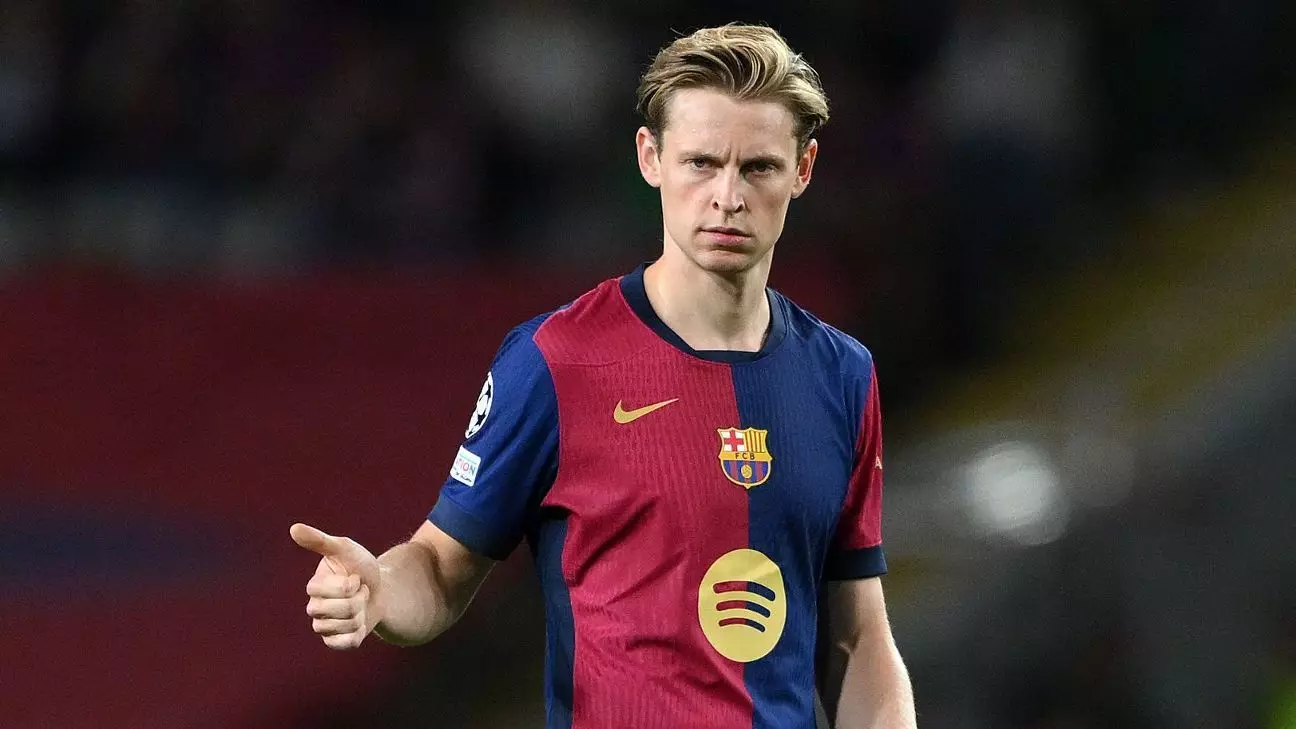Frenkie de Jong’s comeback to FC Barcelona was marked by a significant moment that football fans had eagerly anticipated for nearly five months. After suffering an ankle injury that kept him sidelined since April, De Jong stepped onto the pitch in the 75th minute during Barça’s emphatic 5-0 victory over Young Boys in the UEFA Champions League. This impressive performance not only showcased Barcelona’s potential but also marked a personal triumph for De Jong, who had endured significant scrutiny during his recovery.
Injuries can be a hard pill to swallow for professional athletes, particularly for someone of De Jong’s caliber. His injury occurred during a high-stakes Clasico against rivals Real Madrid, forcing him to miss critical matches including the European Championship. The Dutch midfielder found himself in the uncomfortable spotlight of local media, which scrutinized his recovery process and questioned the legitimacy of his injury. This public attention undoubtedly had an emotional impact on him, as he later admitted that the extended recovery period had its “low moments.”
The Emotional Reception
Upon returning to action, De Jong expressed profound gratitude for the warm reception he received from fans. He stated, “I am really happy with the win and, personally, to be back playing.” It is fascinating how the dynamics between athletes and fans can shape a player’s mental health, especially after a challenging phase like an injury. Expectations from fans can fluctuate, but the positive responses can offer much-needed reassurance and motivation. De Jong’s experience epitomizes the emotional rollercoaster that often accompanies not just physical recovery, but also the quest for acceptance and support on the field.
His comments reflected an awareness of the importance of team dynamics, emphasizing the necessity of maintaining momentum. De Jong’s fierce commitment to the team’s progress post-injury is commendable. “The team is in good form and has been since the start of the season. We have to keep going now, keep improving and see where it takes us,” he remarked, showcasing a collective mindset that can prove crucial in a competitive league like La Liga.
As he resumes his place in the squad, questions naturally arise regarding his role under manager Hansi Flick’s tactics. De Jong’s versatility as a midfielder allows him to adapt to several positions, an attribute that can be invaluable to a coach. He conveyed an open attitude about fulfilling whatever role his coach deems fit for him, exuding professionalism and dedication. This willingness to contribute reflects a mentality that prioritizes team success over individual accolades, a trait that any successful team would cherish.
The nature of team dynamics post-injury also raises interesting questions about squad coherence. De Jong’s commitment to giving “everything I can” not only points towards his personal determination to return stronger but also emphasizes the need for harmony within the team structure.
As the season progresses, Barcelona has shown signs of resilience, bouncing back from an initial setback against Monaco. The team’s performance against Young Boys highlighted their capability to dominate through collective effort, with players like Robert Lewandowski and Raphinha significantly contributing to the scoreline. Flick’s assertion regarding improving defensive aggression and trying to exploit transition spaces shows that Barcelona is evolving tactically.
Also returning to the fold is Ansu Fati, who made his second appearance of the season. The two players, De Jong and Fati, symbolize a renewed hope and talent for Barcelona as they continue to reshape the team in pursuit of glory. It is evident that Barcelona’s current form isn’t just a flash-in-the-pan performance but rather a building block towards a more aggressive and efficient playing style.
Frenkie de Jong’s return serves as both a personal redemption arc and a crucial turning point for Barcelona. As he navigates the challenges of reintegration, his experience could play a pivotal role in the team’s aspirations this season. With an array of talents like Lewandowski and Fati rallying alongside him, the potential for a formidable Barcelona unit remains tangible. As they endeavor to solidify their standing in both domestic and international competitions, the contributions of players like De Jong will be vital. Excitement swells for what lies ahead for both the player and the club as they forge their path in the competitive landscape of football.

